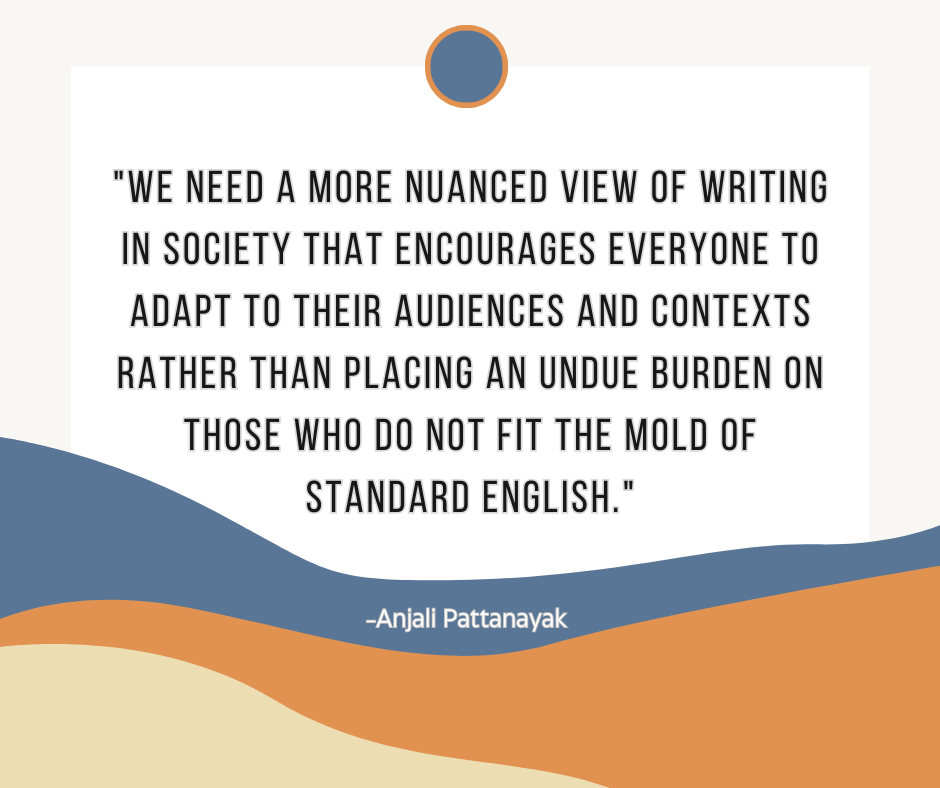Literacy and Composing Processes
Section Overview
Many writing classes begin by asking students to compose a literacy narrative. Literacy narratives connect your writing present with your writing past as a way to help you make sense of how writing might function in your future. Some people love writing about their early alphabetic literacy experiences, often harkening back to their favorite book, the first story they wrote, or challenges they overcame in trying to develop their early communication skills. But this is of course not universally true. For many, reflecting on past literacy experiences can be frustrating, traumatic, or confusing. Wherever you find yourself on this spectrum, we invite you to consider the purpose of reflecting on literacy: to be able to be metacognitive about writing, or aware of the ways that you think about writing, such that you can become a more strategic, skillful communicator. One way to get started is to consider how others have described their literacy.
First, consider an award-winning literacy narrative by MTSU student Jennifer Hale, published in our GEWA Archive, “My Experience With Literacy, Part Two.”
You might also peruse the Digital Archive of Literacy Narratives. This is an amazing resource that provides access to thousands of stories in various forms – video, text, and audio – about people’s literacy experiences.
We hope that reading these essays will be inspiring to you. You can also submit your work for the Gen Ed Writing Awards and maybe have your work published in next year’s GEM!
Consider the five readings in this section that help us think through experiences and skills that help us reflect on our own alphabetic literacy. The first three chapters come from the peer-reviewed, OER textbook, Writing Spaces and address rhetorical ways of reflecting on and composing about literacy:
- “I Need You to Say I” by Kate McKinney Maddalena
- “Weaving Personal Experience into Academic Writing” by Marjorie Stewart
- An Introduction to and Strategies for Multimodal Composing by Melanie Gagich
 The next three chapters come from Bad Ideas About Writing. It is important to note that Bad Ideas About Writing includes titles that can be misleading if you do not read the text itself. The titles for all of the Bad Ideas About Writing essays are actually misleading myths about writing that circulate. It may be confusing, at first, to see these titles. And it is important to keep in mind the content of each essay dispels these popular beliefs about writing that can be found in the titles, by using research from the field. Happily, there are both written and audio versions available for each of these brief, engaging chapters. These readings dispel the ideas that we sometimes have about literacy practices: that there is a “right” way and that stumbling along the way is a problem. Instead, challenge is focal to the process of developing literacy, and there are an endless array of literacy practices that are equally effective:
The next three chapters come from Bad Ideas About Writing. It is important to note that Bad Ideas About Writing includes titles that can be misleading if you do not read the text itself. The titles for all of the Bad Ideas About Writing essays are actually misleading myths about writing that circulate. It may be confusing, at first, to see these titles. And it is important to keep in mind the content of each essay dispels these popular beliefs about writing that can be found in the titles, by using research from the field. Happily, there are both written and audio versions available for each of these brief, engaging chapters. These readings dispel the ideas that we sometimes have about literacy practices: that there is a “right” way and that stumbling along the way is a problem. Instead, challenge is focal to the process of developing literacy, and there are an endless array of literacy practices that are equally effective:

